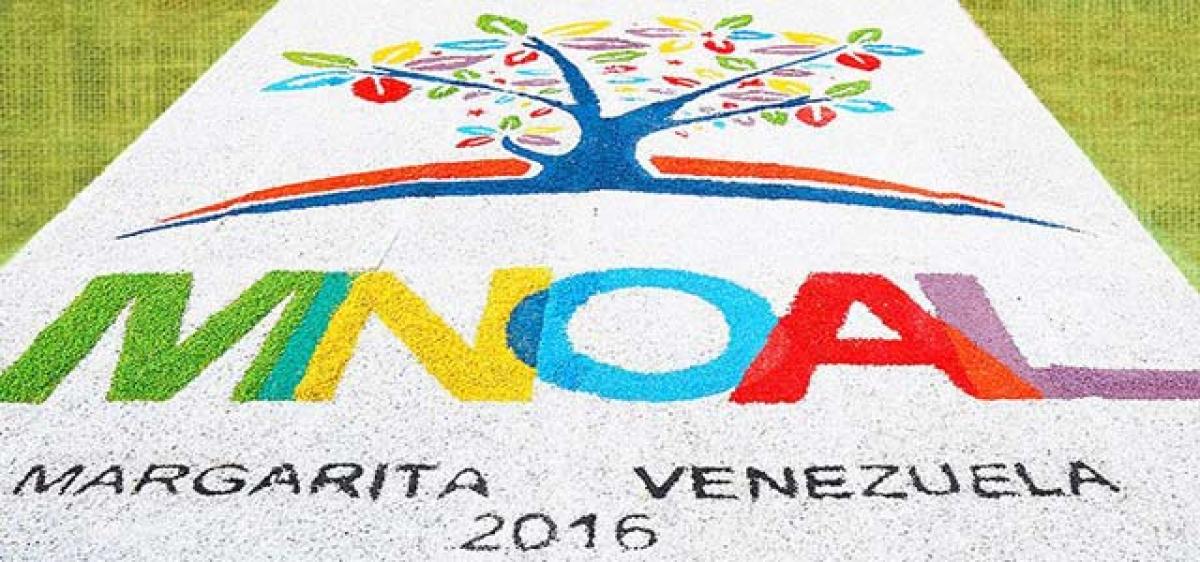Live
- MyVoice: Views of our readers 19th April 2024
- Peddireddi touched my feet for DCC post, recalls Kiran
- All politicos must commit to free press
- Risk of Middle East escalation
- 50 families quit YSRCP, join TDP
- Nara Bhuvaneshwari to File Nomination Papers on Behalf of TDP Chief Chandrababu in Kuppam
- Tamil Nadu BJP Chief Announces End Of Dravidian Politics, Foresees BJP Surge
- YS Jagan's Memanta Siddham Bus Yatra begins in Rajapuram, to enter Kakinada by evening
- Not just promises, look for capacity to deliver them
- Sujana Chowdary files papers for Vijayawada West
Just In

The first NAM summit took place in Belgrade in 1961. The conference was attended by 25 countries. The non-alignment was founded on the collapse of the colonial system and independent struggles of the Afro-Asian and Latin American people at the height of the cold war.
The first NAM summit took place in Belgrade in 1961. The conference was attended by 25 countries. The non-alignment was founded on the collapse of the colonial system and independent struggles of the Afro-Asian and Latin American people at the height of the cold war.
During initial stages it fought for the attainment of freedom and independence of colonial countries. NAM was founded on a common set of principles that included preservation of national sovereignty, rejection of foreign bases, defending the right to self determination and not to join power blocs.
Recently, NAM concluded its seventeenth summit in Margarita, Venezuela. The strength of the NAM increased from 25 in Belgrade to 120 in Margarita.
The Venezuelan NAM summit held in Margarita Island was presided over by President Nicolas Maduro. Venezuela will hold the NAM presidentship until 2019. The theme of the summit was “Peace, Sovereignty and Solidarity for development”.
Commenting on the summit the Indian External Affairs Ministry made a statement that the NAM summit was an important platform for interaction of Latin American and African countries. “NAM continues to represent the space for action in pursuance of the collective interests of the developing world along with G-77, especially on subjects such as the reforms of global economic system and disarmament.”
At the beginning of the summit Venezuela declared that it would spearhead the movement for transformation of UN system which is dominated by the west particularly the US. At the end of the summit the declaration called for the implementation of speedy reforms.
The statement reiterated the need to recover and strengthen the authority of the general assembly as the most democratic, accountable, universal and representative body of the UN. It also called for reform of the Security Council in order to transform it into a more democratic, effective, efficient, transparent and representative body in line with contemporary geopolitical realities.
In this context we can quote the statement of Hamid Ansari at the summit meeting that “the UN lies at the heart of the multilateral system setup at the end of the second world war. Today, we need to ask whether an organization designed in 1945 with just 51 member states is really an appropriate to serve the needs of an international community that now comprises 193 independent sovereign states facing 21st Century challenges to their citizens wellbeing and security.”
The Venezuela summit made a frontal attack on terrorism representing our anti-terrorist sentiments. The Margarita Declaration stressed that it “constituted one of the most serious threats to international peace and security”. It called on member states to prevent and combat terrorism “in all its forms and manifestations, including its financing and illicit transfer of weapons”.
At the same time the declaration reaffirmed the NAM position that terrorism and violent extremism “should not be associated with any religion, nationality, civilizations or ethnic group, and that these attributions should not be used to justify terrorism or counter terrorism measures that include, inter alia, profiling of terror suspects and intrusion of personal privacy.”
Besides terrorism poverty eradication, promoting peace and addressing the climate change on the world stage are the other priority areas of NAM. President Maduro in his concluding speech said that the NAM represented the “struggle of the peoples of the south for their right to peace.”
The NAM’s relevance is questioned in the international for a now a days. The meaning of the NAM doesn’t confine only to the non-alignment with power blocs but it also means to have the freedom of judgement and action.
It remains valid in the present context than ever before irrespective of the polarity of the world. NAM committed to an international economic order based on the principles of equity and justice for which India stands till today in the global trade and environmental negotiations.
Peace still eludes the strife torn contemporary world. Aggressions, intervention, violation of sovereignty are the dominant features of present world order. Still protectionism prevails in international trade.
While, the global landscape has changed, the values and principles on which they laid the foundations of the movement namely respect for sovereignty, peaceful settlement of disputes and international cooperation are very much relevant even today.
NAM is criticised on ideological front too but, it can be repudiated by citing the examples of anti-colonialism, anti-imperialism, anti-racism as its ideological stance.
India and NAM
India’s association with NAM is quite necessary in the present context of the world. Its aspirations for the entry to the UN’s high table, the Security Council will be fulfilled only with the active support of non-aligned bloc.
Its exclusive dependence on the west to get Security Council membership can be counterproductive.
Its ambition to become one of the super powers of the world can be materialized with the active association with NAM.
The Afro-Asian and Latin American countries eagerly want the Indian leadership to support the cause of third world countries. Hence, it is imperative on the part India to strengthen the hands of the NAM.
By: P Balabrahmaiah
The writer is Ex-CFAO (ICAR)

© 2024 Hyderabad Media House Limited/The Hans India. All rights reserved. Powered by hocalwire.com







